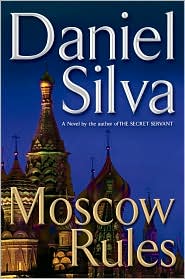So let’s start with a quick plot summary. If you haven’t read Daniel Silva lately, Gabriel Allon, Israeli Secret Service, has been an intentionally low profile hero since hunting down the Munich Olympics terrorists. In this installment, Allon is on his honeymoon with Chiara at a quiet Umbrian villa in Italy, recovering from recent injuries (The Secret Servant) and restoring a 17th Century French 
So why do I wonder if Silva’s books might be “bad for you”? Allon is made to be a very appealing character. Like Jonthan Kellerman’s Alex Delaware (psychologist), P.D. James’s Adam Dalgliesh (poet), and Reginald Hill’s Pascoe (philosophical husband and father), Allon is smart, fast, and tough, but with another dimension: his thwarted career as a painter that has developed into art restoration as an avocation. This split mirrors the inner conflict of Israel that Silva explores: the homeland of the Jews, place of religious and cultural heritage, must be defended with bloodshed and cunning against enemies who choose such means. Allon and his fellow spies sometimes discuss this very issue, agreeing with little hesitation that the ends justify the means, or at least that the means cannot be altered when the “enemy” selects them. The argument is slightly more persuasive to me in a novel and coming from a character of artistic and cultural depth than it has been from the current U.S. administration that sometimes seems to be defending, not any bastion of learning and art, but instead the culture of consumerism–Wal Mart, Disneyland, and McDonald’s. Of course, Silva’s novels are entertainment, or so I reassure myself as I enjoy Allon and his plots. Nonetheless, Silva’s novels echo the “war on terror” that is justification of the Iraq war, the conflict in Afghanistan, and the contemplation of aggression toward Iran, and I wonder if this black and white, good versus evil world stands in too-easy support of black and white thinking in the “real” world as well. Like with thriller movies, we buy the artist’s world view, and that may not be good for our thinking at all.


